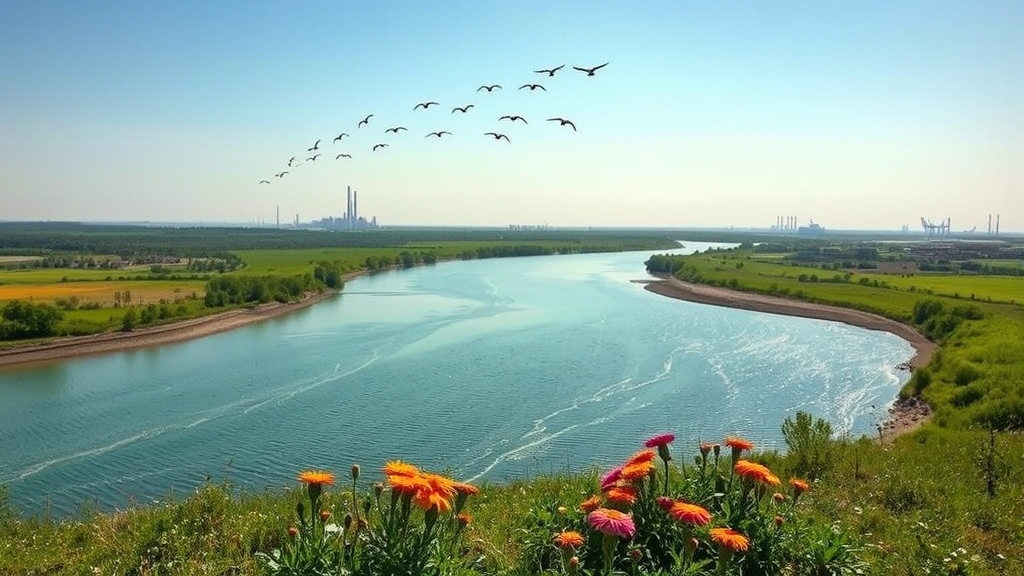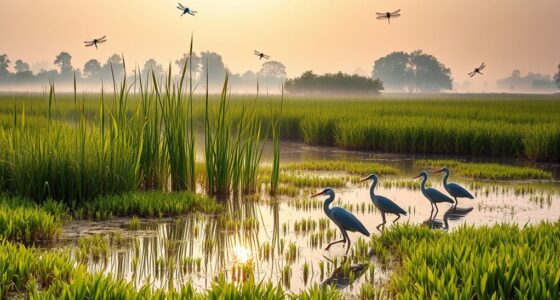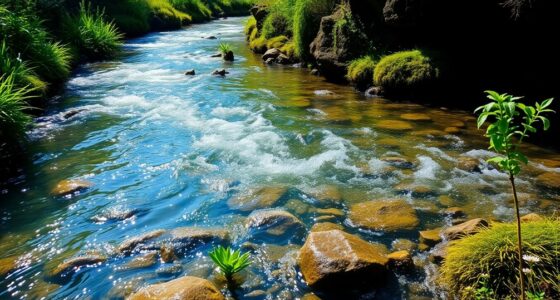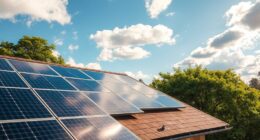Freshwater sources like rivers and lakes are increasingly threatened by pollution hotspots near cities, farms, and industries, which degrade water quality and harm ecosystems. These areas often see runoff containing pollutants that threaten human health and aquatic life. Protecting these essential resources requires targeted conservation efforts, pollution prevention, and community involvement. Staying informed about these threats allows you to take action and support initiatives working to clean and preserve our freshwater systems. Keep exploring to learn more about how you can make a difference.
Key Takeaways
- Freshwater sources like rivers and lakes face pollution hotspots from industrial, agricultural, and urban runoff.
- Protecting water quality requires targeted conservation efforts such as wetland restoration and buffer zones.
- Individual and community actions, including pollution prevention and cleanup initiatives, are vital for water health.
- Ongoing education and awareness are essential to mobilize resources and implement effective water protection strategies.
- Preventing pollution and restoring ecosystems are critical to ensuring sustainable access to clean freshwater.

Have you ever wondered what life would be like without clean freshwater? Without it, everyday activities like cooking, cleaning, and drinking become impossible, and ecosystems that rely on healthy rivers and lakes start to collapse. Sadly, freshwater sources are under serious threat, mainly because of pollution hotspots—areas where contaminants from industries, agriculture, and urban runoff converge, severely degrading water quality. These hotspots are often found near densely populated regions or industrial zones, making it urgent for you and others to recognize the importance of targeted conservation strategies. Protecting your local water bodies involves not just reducing pollution but also implementing measures that prevent contamination in the first place. Conservation strategies like restoring wetlands, establishing buffer zones along waterways, and promoting sustainable land use can markedly reduce the amount of pollutants reaching rivers and lakes. These efforts help filter out harmful substances before they reach water bodies and serve as natural barriers against runoff. As someone who depends on clean water, you can play a part by supporting policies that enforce stricter pollution controls and by adopting eco-friendly habits—like proper waste disposal, minimizing pesticide use, and choosing sustainable products. Education about pollution hotspots is essential because it highlights where you should focus your advocacy efforts. When you understand which areas are most vulnerable and why, you can push for local initiatives that target these specific zones, such as stricter industrial regulations or community-led cleanup projects. Additionally, conservation strategies aren’t just about fixing problems—they’re about preventing future ones. By investing in infrastructure that reduces stormwater runoff and promoting community awareness programs, you help create resilient water systems that withstand environmental pressures. Increasing awareness about pollution hotspots can help mobilize resources and community action more effectively. The fight for clean freshwater isn’t just about large-scale policies; it’s about everyday choices and collective action. Every time you participate in a cleanup, support conservation groups, or advocate for sustainable urban planning, you contribute to safeguarding these essential resources. The importance of addressing pollution hotspots with effective conservation strategies cannot be overstated, because they directly impact the health of rivers, lakes, and the communities that rely on them. Your role is indispensable in this ongoing effort to restore and preserve freshwater sources for generations to come. Without decisive action now, the consequences will only worsen—making access to clean water an increasing challenge for everyone. So, stay informed, get involved, and realize that protecting freshwater isn’t just a distant environmental concern; it’s a personal responsibility that affects your health, your community, and the future of the planet.
Frequently Asked Questions
How Does Climate Change Worsen Freshwater Shortages Globally?
Climate change worsens freshwater shortages globally by causing climate-induced droughts, which reduce water availability when you need it most. Melting glaciers also threaten water supplies, as they serve as essential freshwater sources for many regions. These changes disrupt ecosystems and water access, making it harder for you to find clean, reliable water. As temperatures rise, the problem intensifies, putting even more stress on already strained freshwater resources worldwide.
What Innovative Technologies Are Being Developed to Clean Polluted Water?
You might be interested in innovative water-cleaning technologies. Desalination breakthroughs now make removing salt from seawater more energy-efficient and affordable. Additionally, bioremediation methods use natural organisms like bacteria and plants to break down pollutants, offering eco-friendly solutions. These advancements help combat water pollution, ensuring cleaner water sources. As technology progresses, you can expect more sustainable and effective ways to secure safe, clean water for communities worldwide.
How Do Water Rights Impact Marginalized Communities?
Did you know that over 2 billion people lack reliable water access? Water rights substantially impact marginalized communities, especially Indigenous groups, whose sovereignty is often overlooked. You might not realize it, but water access disparities prevent these communities from securing clean water, threatening their health and culture. When water rights are denied or misused, it deepens inequality, making it harder for marginalized populations to thrive and protect their traditional lands.
What Role Do Governments Play in Preventing Water Privatization?
You should understand that governments play a vital role in preventing water privatization through strong public policy and effective regulatory frameworks. By establishing clear laws and oversight, they protect public access to water resources and limit private control. Your government can also enforce standards that guarantee water remains affordable and safe, preventing corporations from prioritizing profit over community needs. Active government intervention is key to safeguarding water as a public good.
Can Individual Actions Significantly Improve Global Freshwater Availability?
You can make a real difference in improving global freshwater availability through household conservation and community activism. By reducing water use at home, you help ease the strain on local water sources. Participating in community efforts raises awareness and urges policymakers to adopt sustainable practices. Your actions, combined with others’, can create a ripple effect that promotes better water management and helps secure clean water for everyone worldwide.
Conclusion
Your actions are the ripple that shapes this vast, fragile water world. Every choice you make is a drop that either nourishes or drains the river of life. The future of lakes and rivers depends on your commitment to protect and preserve. Remember, the water’s flow reflects your care—pause, act, and be the current that turns the tide toward hope. Together, you can keep the wellspring of life alive for generations to come.








